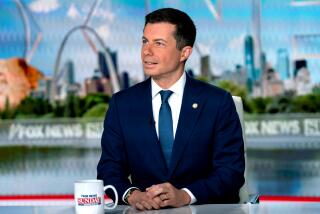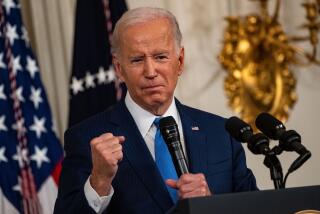For Gore, Silence on Calls May Hurt Presidential Bid
- Share via
WASHINGTON — For many months, Vice President Al Gore had played the role of the proper public official, declining to defend his part in the campaign fund-raising controversy while Atty. Gen. Janet Reno was deciding whether an independent counsel should take over the Justice Department’s investigation.
Reno announced her decision Tuesday: no independent counsel. Yet Gore, set free of that restraint, still refused to give his own defense of the phone calls he placed from his office to major Democratic campaign contributors.
“It’s a different rationale now,” Gore said with a self-conscious laugh in an interview. “During these last few months, I thought it was appropriate to not comment while this independent review was underway. Now that it has concluded, I think that we can put these phone calls in the past.”
How is that non-denial likely to affect his prospects for the presidency in 2000? The vice president’s handling of the donor scandal may extricate him from his immediate legal difficulties. But in the long run, his strongest political suit is now in question. While his stiffness and formality seemed to inhibit his political career, he has always projected an aura of uncommon credibility.
The real danger now is that his non-answers may have damaged that credibility.
As for the legal charges still hanging over him, Gore said his comments of last March, when he constantly repeated that there was “no controlling legal authority” spelling out whether his phone calls were legal, would stand as his final word. That lawyerly formulation left many to conclude that the vice president was looking for a legal loophole instead of an explanation that would satisfy the public.
But Gore, sitting in a straight-backed chair in his White House office, said the American people did not want to hear anything more from him on the subject. “They want to see us focus on the issues that they’re really concerned about,” he stressed.
Shyness, Propriety Prevail, Friends Say
Gore’s non-defense, according to his friends and close advisors, stems from a combination of shyness and an obsessive sense of propriety, a legacy of his father, a courtly Southern gentleman who represented Tennessee in Congress for three decades.
One longtime confidant said the past year had been “painful” for Gore because it was the first time in 21 years of public service that his integrity had been seriously questioned. The confidant, who has known the vice president since he was a teenager, said Gore had always been “reserved.” He said Gore’s reluctance to talk about his difficulties reflected “an acute sense of wanting to be fair and a difficulty in judging himself.”
The vice president’s unwillingness to rise to his own defense reflects a politician whose instincts and abilities are quite different from those of his boss.
While Clinton views words as his friends, particularly when he is in a political bind, Gore seems to regard them as potentially dangerous objects to be used sparingly and with precision. The president launches into articulate justifications at every minor provocation. The vice president prefers to change the subject.
That cautiousness has served Gore well in his role as Clinton’s understudy. In the early days of the Clinton presidency, it provided a sense of self-discipline and stability to an administration with a reputation for sloppiness.
But it may not be such an asset as he attempts to step out of Clinton’s shadow and persuade the American people three years from now that he deserves to move his belongings to the White House.
‘Sterling Image’ Born in Efficiency
His need to do the right thing has left Gore with his Boy Scout image and earned him his reputation as stiff--labels that Gore himself does not dispute. Political analysts say it is partly to blame for his difficulties over the past year.
“This guy has a sterling image,” said James Thurber, a political scientist at American University. “Part of the sterling image is that he does efficiently what people ask him to do.”
Both Clinton and Gore were under considerable pressure from Democratic Party officials and staffers to make calls to potential donors. Clinton, who has a tendency to procrastinate, got around to making only a few. Gore, by contrast, made 45 phone calls in 10 or 11 sessions, according to Reno’s probe.
“He did it because his staff asked him to do it and said it was OK,” said Thurber. “It was the very character trait of the good Boy Scout that got him into trouble.”
Gore, acutely aware of his wooden image, frequently makes self-deprecating jokes about it. It’s a legacy, Gore said, of the preeminent Tennessee politician and statesman, Cordell Hull, who served in Congress from 1907 to 1933 and then was secretary of State for 11 years.
“I think I learned a formal style of politics in my home area of Tennessee,” Gore said, striking a thoughtful, relaxed pose with his face resting on his hand. “My father learned it from Cordell Hull, who was from our hometown, and I learned it from him. I think that a few years ago you would have probably seen an even more pronounced formality in my public presentation.”
Style Didn’t Hurt Previous Campaigns
His stiff style did not hurt him in his campaigns for the House and, later, the Senate, in part because he never faced a tough opponent. Nevertheless, he worked on his political performance, a practice that reaped results in his 1996 campaign on the Clinton-Gore ticket. His delivery, energetic and funny, was a crowd-pleaser.
But once back in Washington, with the cloud of the donations scandal over his head, the vice president seemed to slip back into his shell.
“Over the years, I have learned how to shed a lot of that formality and, if you’ll forgive the expression, stiffness,” he commented. “Yet I learn regularly from late-night TV comics that it’s not all gone yet.”
Gore’s uptight public demeanor perplexes his advisors and many journalists who have traveled with him extensively outside Washington. When he is not speaking for the public record, Gore comes across as an engaging human rather than the robotic figure he often projects in official settings. He has a quick wit and speaks fluidly on difficult subjects.
Although Gore understands the potential political gain in loosening up more, he makes it clear the public is not about to see the private Gore.
“The tradition in which I learned politics is one that is infused with the deepest respect for public service and emphasizes care and accuracy in the discussion of issues and matters being debated before the American people,” Gore said. “I take public service very seriously, and I give it my very best. I really believe in it. That seriousness of purpose partly accounts for what people see as stiffness.”
The dichotomy between Gore’s public and private personalities gives him the unnerving ability to poke fun at his excessively controlled manner and then continue on in the same practiced, measured tone when he is no longer joking.
When asked whether he was relieved to have the Reno decision in his past, Gore began by mimicking the stiff response he gave Tuesday when the news came out: “I was pleased with the decision,” Gore said, and then paused, with a smirk on his face, indicating that he was mocking his own seriousness.
But then, instead of giving a more revealing answer, he went on, seriously this time, with a version of his careful script about how he kept his focus on the people’s business despite the controversy.
Gore’s determination not to stoop to defend himself was also apparent when he was asked about Rep. Richard A. Gephardt (D-Mo.), who, in preparation for the next presidential campaign, has already started taking regular shots at Gore and the whole Clinton administration. Gephardt rounded up enough House Democrats to defeat the White House on “fast-track” trade legislation last month, and this week he accused Gore, Clinton and other “New Democrats” of lacking “core values.”
Gore refused to take the bait, saying only that he planned to work to unite the Democratic Party before the 1998 elections. “I’ve had a good working relationship with him,” Gore said of Gephardt. “Working together doesn’t mean always agreeing.”
Gore’s resistance to jumping into political donnybrooks gives him an unusual ability to tune out the politics of the day and dig deep into important, but difficult, policy issues.
One aide, who works with both Clinton and Gore on technology issues, put it this way: “The intellectual rigor he brings to examining issues is legend here. If I have a meeting with the president, I prepare for an hour. If I have a meeting with the vice president, I prepare for two hours because he’ll ask more questions, and you don’t want to go in knowing less than he does.”
On the other hand, the vice president leaves the public no opportunity to see some of the cracks in his armor that would make him appear better rounded and more human. Two episodes separated by 20 years illustrate Gore’s fear of exposing a more human face.
In 1976, when Gore decided on short notice to run for the House seat his father used to hold, he was so nervous that he threw up right before his announcement speech, a very human response that he recounted to a reporter on the campaign trail last year.
But when the reporter asked to use the episode in a story, Gore tensed and said he did not want to see it in print. His reason: It wouldn’t be dignified.
Times staff writer Edwin Chen contributed to this story.
More to Read
Get the L.A. Times Politics newsletter
Deeply reported insights into legislation, politics and policy from Sacramento, Washington and beyond. In your inbox twice per week.
You may occasionally receive promotional content from the Los Angeles Times.








